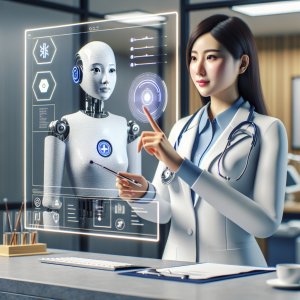AI Chatbots in Healthcare: Revolutionizing Patient Care

In recent years, AI chatbots have made significant strides in various industries, with healthcare being one of the most promising fields. These intelligent systems are reshaping the landscape of patient care by offering a range of benefits that include improved diagnosis, treatment, and personalized patient support. AI chatbots are essentially software applications that use machine learning and natural language processing to simulate human conversations, providing users with virtual assistance in real-time.
One of the primary reasons for the rapid adoption of AI chatbots in healthcare is their ability to handle a high volume of patient interactions efficiently. They can provide immediate responses to patient queries, assist with appointment scheduling, and even offer preliminary medical advice based on symptom analysis. By doing so, they help to alleviate the burden on healthcare professionals, allowing them to focus on more complex and critical tasks.
Moreover, AI chatbots are available 24/7, ensuring that patients have access to support at any time. This round-the-clock availability can be particularly beneficial for patients with chronic conditions who may need continuous monitoring and assistance. The integration of AI chatbots into healthcare systems also facilitates better data collection and analysis, leading to more informed decision-making and improved patient outcomes.
If you’re interested in leveraging the power of AI chatbots in your healthcare practice, consider enrolling in our Learn AI Chatbot Course to gain the skills needed to build powerful AI chatbots tailored to your needs.
Benefits of AI Chatbots for Patients
The integration of AI chatbots in healthcare offers numerous benefits for patients, enhancing their overall experience and satisfaction. One of the most significant advantages is the immediate access to information and support. Patients no longer need to wait for hours to get answers to their health-related queries. AI chatbots can provide instant responses, helping patients make informed decisions about their health and well-being.
Another critical benefit is the personalized care that AI chatbots can offer. By analyzing patient data, including medical history and current symptoms, these intelligent systems can provide tailored advice and recommendations. This personalized approach helps in creating a more engaging and effective patient experience, as the information provided is relevant and specific to the individual’s needs.
AI chatbots also play a vital role in mental health support. They can engage in conversations with patients who may be experiencing anxiety, depression, or other mental health issues, offering a non-judgmental and confidential space to express their feelings. This can be particularly valuable for patients who may feel uncomfortable discussing their mental health concerns with a human therapist.
Moreover, AI chatbots can help patients manage their medications by providing reminders and information about dosage and potential side effects. This ensures better adherence to treatment plans, ultimately leading to improved health outcomes. Additionally, these chatbots can assist in scheduling appointments and follow-ups, reducing the administrative burden on patients and ensuring they receive timely care.
Overall, the implementation of AI chatbots in healthcare significantly enhances the patient experience by providing accessible, personalized, and efficient support.
Enhancing Diagnostic Accuracy with AI

One of the groundbreaking advantages of AI chatbots in healthcare is their ability to enhance diagnostic accuracy. By leveraging advanced algorithms and vast datasets, AI can assist healthcare professionals in making more accurate diagnoses. Chatbots are capable of collecting and analyzing patient symptoms in real-time, which allows for quicker and more precise identification of potential health issues.
AI chatbots can perform preliminary assessments by asking patients a series of questions about their symptoms, medical history, and lifestyle. This information is then processed using sophisticated machine learning models that compare the patient’s data with a vast repository of medical knowledge. As a result, the chatbot can suggest possible diagnoses and recommend further tests or consultations with specialists.
Moreover, AI chatbots are proficient in identifying patterns that might be overlooked by human practitioners. For instance, they can detect early signs of chronic conditions such as diabetes or cardiovascular diseases by analyzing subtle changes in a patient’s health data over time. This early detection is crucial for initiating timely interventions and improving patient outcomes.
In addition to aiding in diagnosis, AI chatbots can also provide continuous monitoring and follow-up care. They can track the progress of a patient’s condition and alert healthcare providers if there are any alarming changes. This continuous monitoring ensures that any potential complications are addressed promptly, thereby minimizing the risk of severe health issues.
Furthermore, AI chatbots facilitate the sharing of diagnostic information between healthcare providers. By maintaining a comprehensive and up-to-date record of a patient’s health data, they ensure that all relevant information is available to different specialists involved in the patient’s care. This integrated approach enhances the overall quality of care and ensures that diagnoses are as accurate and comprehensive as possible.
AI Chatbots in Patient Engagement

In the realm of healthcare, patient engagement is pivotal for improving outcomes and ensuring patient satisfaction. AI chatbots in healthcare play a significant role in enhancing patient engagement by providing personalized and timely interactions. These chatbots serve as a bridge between patients and healthcare providers, making communication more efficient and accessible.
AI chatbots can offer 24/7 support, addressing patient queries and concerns at any time of the day. This constant availability is particularly beneficial for patients who may have urgent questions or need reassurance outside of regular office hours. By providing immediate responses, chatbots help alleviate patient anxiety and improve their overall experience with the healthcare system.
Moreover, AI chatbots can deliver personalized health advice based on individual patient data. By analyzing a patient’s medical history, current health status, and lifestyle factors, chatbots can offer tailored recommendations for managing conditions, adhering to treatment plans, and making healthier lifestyle choices. This personalized approach fosters a sense of trust and engagement, as patients feel that their unique needs are being addressed.
Another key aspect of patient engagement is the ability to schedule and manage appointments effortlessly. AI chatbots can handle appointment bookings, send reminders, and even reschedule appointments if necessary. This reduces the administrative burden on healthcare staff and ensures that patients have a seamless and convenient experience.
In addition to managing appointments, AI chatbots can also facilitate medication adherence by sending reminders to patients about their prescriptions. They can track medication schedules, provide information about potential side effects, and alert patients when it’s time to refill their prescriptions. This proactive approach helps patients stay on track with their treatment plans and avoid potential health complications.
Furthermore, AI chatbots can gather patient feedback through surveys and questionnaires. By collecting and analyzing this feedback, healthcare providers can gain valuable insights into patient satisfaction and identify areas for improvement. This continuous loop of feedback and improvement enhances the overall quality of care and strengthens the relationship between patients and healthcare providers.
Challenges of Implementing AI Chatbots

While the benefits of AI chatbots in healthcare are substantial, the implementation of these advanced systems is not without its challenges. One of the primary obstacles is ensuring data privacy and security. Healthcare data is highly sensitive, and any breach can have severe consequences for both patients and healthcare providers. Therefore, robust encryption methods and stringent data protection protocols are essential to safeguard patient information.
Another significant challenge is the integration of AI chatbots with existing healthcare systems. Many healthcare organizations use legacy systems that may not be compatible with modern AI technologies. This integration requires considerable time, effort, and investment, as it involves updating or even overhauling current IT infrastructure.
Additionally, the accuracy and reliability of AI chatbots are critical for their successful deployment. While AI has made significant strides, there are still instances where chatbots may provide incorrect or incomplete information. Ensuring that chatbots have access to up-to-date and comprehensive medical databases is crucial for maintaining their effectiveness and reliability. Continuous monitoring and updating of these systems are necessary to minimize errors and improve performance.
Training AI chatbots to understand and respond to a wide range of medical queries is another complex task. This requires extensive datasets and sophisticated machine learning algorithms. Moreover, chatbots must be able to handle the nuances of human language, including slang, regional dialects, and varying levels of health literacy. Achieving this level of sophistication demands significant resources and expertise.
There is also the issue of patient trust and acceptance. Some patients may be hesitant to interact with AI chatbots due to concerns about accuracy, privacy, or a preference for human interaction. Building trust through transparent communication about how these systems work, their benefits, and their limitations is essential for encouraging patient adoption.
Lastly, regulatory and compliance issues pose a challenge for the implementation of AI chatbots. Different regions have varying regulations regarding the use of AI in healthcare, and ensuring compliance with these laws can be complex. Healthcare providers must navigate these regulatory landscapes carefully to avoid legal pitfalls and ensure that their AI solutions meet all necessary standards.
Future Trends in Healthcare AI Chatbots

The future of AI chatbots in healthcare looks incredibly promising, with several exciting trends on the horizon. One notable trend is the advancement of natural language processing (NLP) capabilities. As NLP technology continues to improve, AI chatbots will become even more adept at understanding and responding to complex medical queries, making interactions more seamless and effective.
Another emerging trend is the integration of AI chatbots with wearable health technology. Devices such as smartwatches and fitness trackers can provide real-time health data to AI chatbots, enabling more personalized and timely health interventions. This integration can help in early detection of potential health issues and provide instant recommendations for lifestyle modifications or medical consultations.
AI chatbots are also expected to play a more significant role in mental health support. With the rise in mental health issues, chatbots can provide immediate assistance, helping to bridge the gap in mental health services. These chatbots can offer initial screenings, provide coping strategies, and even connect patients with human therapists when necessary.
Furthermore, the use of AI chatbots in remote patient monitoring is set to expand. By continuously monitoring patients’ health metrics and providing real-time feedback, chatbots can help manage chronic conditions more effectively. This is particularly beneficial for patients in rural or underserved areas who may have limited access to healthcare facilities.
In terms of diagnostics, AI chatbots are expected to become more sophisticated, aiding healthcare professionals in making quicker and more accurate diagnoses. By analyzing vast amounts of medical data, these chatbots can identify patterns and correlations that might be missed by human eyes, leading to better patient outcomes.
Lastly, the integration of AI chatbots with electronic health records (EHRs) will streamline administrative tasks, reducing the burden on healthcare providers. This integration can automate appointment scheduling, prescription refills, and patient follow-ups, allowing medical staff to focus more on patient care.
As we move forward, continuous advancements in AI and machine learning will drive these trends, further embedding AI chatbots into the healthcare ecosystem. For those interested in harnessing the power of AI chatbots, now is the perfect time to get started. Learn AI Chatbot Course can provide you with the skills and knowledge to build powerful chatbots tailored for the healthcare industry. Don’t miss out on the opportunity to be at the forefront of this technological revolution!








